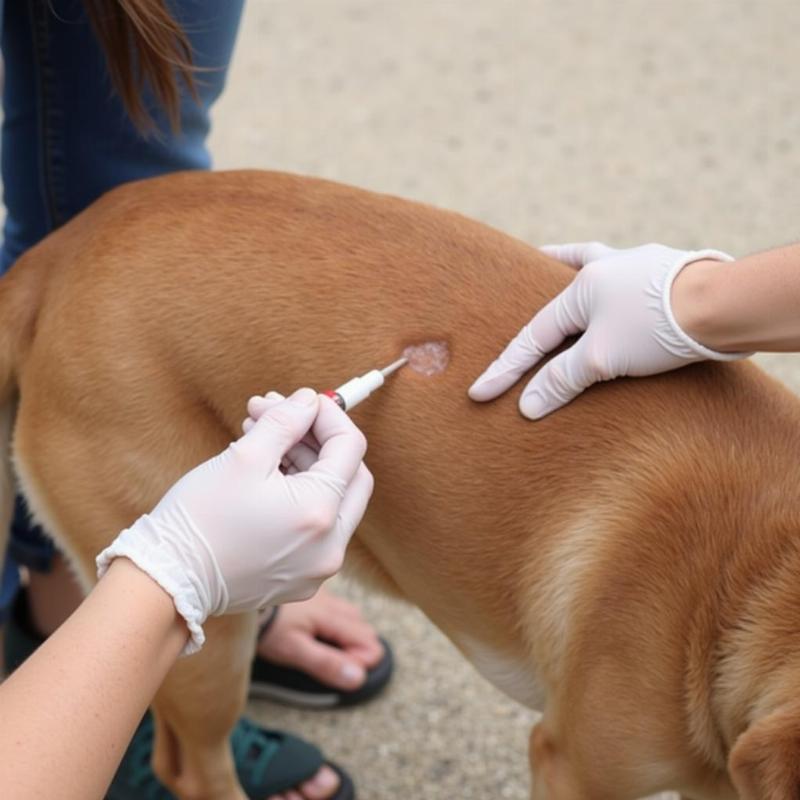Fleas are a common nuisance for dog owners across the US. These tiny parasites can cause intense itching, skin irritation, and even transmit diseases. So, is there a shot for fleas for dogs? The answer is not a simple yes or no. While there isn’t a single injection that completely eradicates fleas, there are injectable flea preventatives available that offer effective, long-lasting protection. Let’s explore the various options for flea control, including injectable medications, to help you keep your furry friend flea-free.
Understanding Injectable Flea Treatments for Dogs
Injectable flea preventatives offer a convenient alternative to topical treatments or oral medications. These injections, administered by a veterinarian, typically provide protection for several weeks or even months. They work by targeting different stages of the flea life cycle, preventing reproduction and ultimately breaking the flea infestation cycle.
How Injectable Flea Medications Work
Most injectable flea preventatives work by disrupting the flea’s nervous system. This prevents the fleas from biting and reproducing, effectively controlling the infestation. Some injections also sterilize female fleas, further reducing the population.
Benefits of Injectable Flea Control
Injectable flea medications offer several advantages:
- Long-lasting protection: A single injection can protect your dog for weeks or months, eliminating the need for frequent applications.
- Convenience: No need to remember daily or monthly doses.
- Waterproof: Unlike some topical treatments, injectable medications are not affected by bathing or swimming.
- Effective for sensitive dogs: Injectable medications can be a good option for dogs who are sensitive to topical treatments or have difficulty taking oral medications.
Potential Side Effects of Injectable Flea Treatments
While generally safe, injectable flea preventatives can sometimes cause mild side effects, such as temporary hair loss or skin irritation at the injection site. In rare cases, more serious reactions, such as vomiting, lethargy, or tremors, can occur. It’s crucial to discuss any potential risks with your veterinarian.
Exploring Other Flea Control Options for Dogs
Beyond injectable medications, several other flea control methods are available:
Topical Flea Treatments
Topical treatments are applied directly to your dog’s skin, typically on the back of the neck. These products offer quick-acting flea control but require regular reapplication.
 Topical Flea Treatment for Dogs
Topical Flea Treatment for Dogs
Oral Flea Medications
Oral flea medications are available in chewable tablets or pills. They offer convenient monthly protection and are highly effective.
Flea Collars
Flea collars provide continuous protection against fleas and ticks. Some collars release medication slowly over time, while others repel fleas with natural ingredients.
Choosing the Right Flea Control for Your Dog
Selecting the most suitable flea control method depends on various factors, including your dog’s breed, age, health, lifestyle, and the severity of the flea infestation. Consulting with your veterinarian is essential to determine the safest and most effective option for your furry companion. They can assess your dog’s specific needs and recommend the best course of action.
Conclusion
While a single “flea shot” doesn’t exist, injectable flea preventatives offer a long-lasting and convenient solution for flea control in dogs. Remember to discuss all flea control options with your vet to find the best fit for your dog’s individual needs. Regular preventative measures, combined with good hygiene practices, are key to keeping your dog happy, healthy, and flea-free.
FAQ
- How long does an injectable flea treatment last? Injectable flea treatments typically provide protection for one to six months, depending on the specific product.
- Are injectable flea treatments safe for puppies? Always consult your veterinarian before using any flea treatment on puppies, as some products may not be suitable for young dogs.
- Can I use other flea control methods along with an injectable treatment? Your veterinarian can advise on combining different flea control methods safely and effectively.
- What should I do if my dog has a flea allergy? If your dog is allergic to fleas, prompt and effective flea control is essential. Consult your veterinarian for appropriate treatment options and allergy management.
- How can I prevent fleas in my home? Regular vacuuming, washing pet bedding, and treating the environment with flea sprays can help prevent flea infestations.
- Are there natural flea control options for dogs? Several natural flea repellents are available, including essential oils and diatomaceous earth. However, their effectiveness can vary.
- How often should I give my dog a flea bath? The frequency of flea baths depends on the severity of the infestation and the product used. Consult your veterinarian for guidance.
Related Articles
- are himalayan dog chews safe
- non rawhide bones for large dogs
- hard cheese sticks for dogs
- yak dog treats shark tank
Beautdogs.us is your ultimate guide to navigating the exciting world of dog ownership in the US. We offer expert advice on dog breeds, care, and products tailored to the American pet parent. Whether you’re a seasoned dog owner or just starting your journey, Beautdogs.us is your trusted source for comprehensive and engaging information. Contact us today! Email: [email protected], Phone: +1 501-555-7529 or visit us at Beautdogs.us.